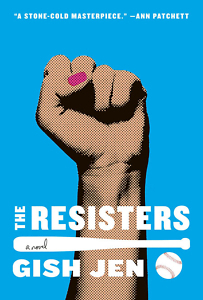Pitching for a Level Field
In The Resisters, Gish Jen depicts an eerily plausible near-future dystopia
Swollen seas and flotillas of 3-D-printed houseboats sheltering the disenfranchised. Millions of careers — and professionals — made obsolete by artificial intelligence. Total surveillance. An immigration policy called “Ship ‘em’ Back.” Gish Jen sets her fifth novel, The Resisters, in a near-future dystopia that seems all-too plausible given the trajectory of current affairs.

The ravages of climate change and the rise of artificial intelligence and digital automation have accelerated the decay of traditional nation-states, leaving the world with two superpowers on opposite hemispheres: AutoAmerica and ChinRussia. Citizens are divided between the “Netted,” who occupy necessary career positions in the new economy, and the “Surplus,” people whose careers have been rendered obsolete by technology and who have been classified as “unretrainable.”
The overwhelmingly “angelfair” Netted live comfortably on high ground, while the predominantly “coppertoned” Surplus survive on 3-D-printed houseboats tethered together, where they are constantly surveilled by “Aunt Nettie” and its army of enforcement drones. They live in fear of being tortured or having their houseboats cast off from the other Surplus homes into the overpowering waves. Food dispensed to the Surplus population is laced with sedatives. Playgrounds are gassed to keep Surplus children weak and docile.
Jen’s narrator is one of the Surplus, a former ESL teacher named Grant, who notes that even though the powerful Netted live in comparative luxury, life on the other side is fraught with an undertone of despair. “They were not lighthearted; they were preoccupied. Where we Surplus had to concertedly consume, after all, they had to concertedly produce,” Grant says. “The anxiety about success — how you fought to define it for yourself, even as others blithely defined it for you…. They walked as if they had enormous boulders to roll up a hill and no RockBots to help.”
Jen masterfully builds her dystopian world, depicting how easily such a change can creep over a populace too ready to trade liberty for convenience. “And as for the resulting reality, was it not disconcertingly like the sea level rise and heat and wind we knew, long ago, would come with climate change but have since come to call normal?” Grant wistfully explains. “And yet it was something we humans did finally choose. After all, it was not the earth that chose it, or any other creature. It was we who made our world what it was. It was we who were responsible.”
 A chance at liberation — and, perhaps, salvation — presents itself, ironically (or perhaps fittingly), through the great American pastime: baseball. Grant and his wife, a civil rights attorney, have a daughter named Gwen, who was born with a golden arm. When Aunt Nettie learns of her gift, Gwen is recruited to pitch for AutoAmerica against ChinRussia in the Olympics, and consequently she must choose whether to rise out of the peril and poverty of Surplus existence and become one of the Netted or use her fame in an effort to blow up the system.
A chance at liberation — and, perhaps, salvation — presents itself, ironically (or perhaps fittingly), through the great American pastime: baseball. Grant and his wife, a civil rights attorney, have a daughter named Gwen, who was born with a golden arm. When Aunt Nettie learns of her gift, Gwen is recruited to pitch for AutoAmerica against ChinRussia in the Olympics, and consequently she must choose whether to rise out of the peril and poverty of Surplus existence and become one of the Netted or use her fame in an effort to blow up the system.
Though Jen seems to relish the world-building aspect of dystopian science fiction, The Resisters is, at heart, a story about love, family, and the core values of freedom and independence. The humor here is drier and more wry than in Jen’s past efforts; the bleak reality of AutoAmerica (and the degree to which it feels credible, if not inevitable) darkens the moments of levity.
The immersive details about baseball can at times resemble Melville’s digressions on whale parts in Moby-Dick (perhaps not coincidentally, Melville gets a nod here in Gwen’s affection for Bartleby the Scrivener’s famous riposte, “I would prefer not to”). The point, however, bears out. As Jen herself recently remarked, “The idea that a playing field should be level is embedded in baseball. So is the idea that everyone should have a chance at bat.” Does it seem so unlikely that in such a dystopian future the rallying cry of revolution might be “Play ball?”

Ed Tarkington’s debut novel, Only Love Can Break Your Heart, was published by Algonquin Books in 2016. His second novel, The Fortunate Ones, is forthcoming from Algonquin in fall 2020. He lives in Nashville.


